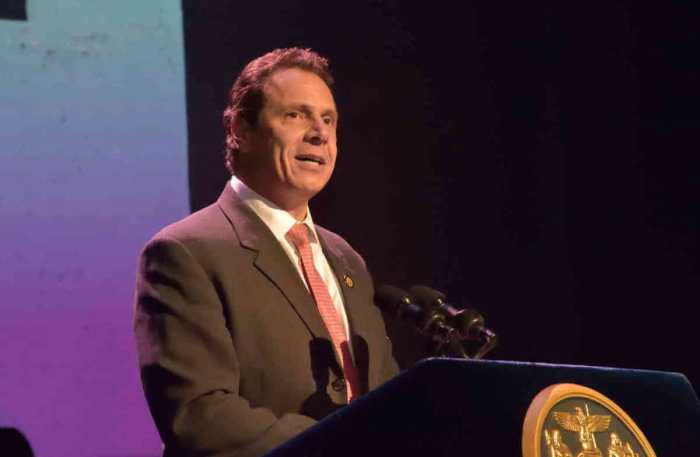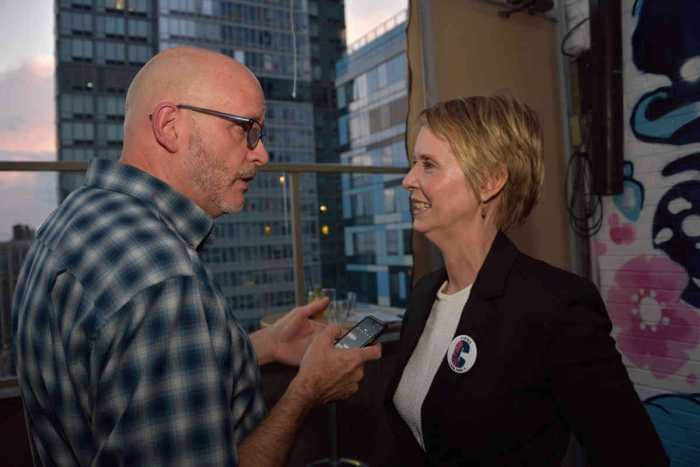On April 14, Cynthia Nixon claimed the Working Families Party nomination for governor. | CYNTHIAFORNEWYORK.COM
It’s official, Cynthia Nixon is no longer merely the actress from “Sex in the City,” but now the official candidate of the Working Families Party, with the opportunity to stay on that ballot line in the November election.
The candidate damned for being “inexperienced” and even an “unqualified lesbian” outmaneuvered Governor Andrew Cuomo in a game of insider baseball. Cuomo suffered an abject defeat, and then lashed out by strong-arming unions to stop contributing to and supporting the WFP.
Nixon is now the candidate of a united left disgusted with what activists see as “corporate” Democrats who compromise their principles to avoid taxing the ultra-wealthy. Also meeting on Saturday, April 14, in Albany was an affiliate of Bernie Sanders’ Our Revolution, the New York Progressive Action Network, which endorsed Nixon, as well. Ken Lovett at the New York Daily News reported the local affiliate will press the national organization to give Nixon the nod.
NEWS ANALYSIS: With new posture on drugs, justice, challenger rallies the left
Sanders, careful about getting involved in primaries where one Democrat feuds with another, has made it clear that Nixon will have to prove she is capable of ousting Cuomo before he would get involved.
The critical challenge facing the WFP candidate is making New Yorkers care if they vote for Cuomo or her. How would she make life different by being governor and would that matter to the voters?
Given that everyone is being told that Donald Trump is the problem, why does it matter if Nixon or Cuomo is elected? Nixon can expect decent media coverage until the final weeks before the Democratic primary, at which point attention usually bends in favor of the incumbent, especially an incumbent like Cuomo who nurtures wealthy support.
But Nixon is already changing policy in the state. On the same day Cuomo gave up on seeking WFP support, he conceded that New York would legalize pot at some point. Possibly, he would even push a legalization bill in the final weeks of the legislative session. With Senate Republicans likely having continued control over the agenda, they and Cuomo could enact a cramped, restrictive bill comparable to their narrow medical marijuana bill that in two years has registered 49,780 patients, though the state is unable to say how many actively use the program. It allows certain patients for specified illness to obtain drinkable solutions and pills that alleviate specific symptoms. But no patient is allowed to smoke pot or enjoy the euphoria that comes from its high. That is prohibited in New York.
Other states that enacted medical marijuana by referendum like California created programs that gave pot to virtually anyone who sought it: have a bad back, a person could buy pot. Depressed and having a bad reaction to HIV meds, ditto — pot was available. Cuomo and many New Yorkers mocked this permissive approach. But its real purpose was to educate consumers and give them a mindset where they thought about what they wanted from using marijuana.
Public health advocates are trying to change people’s mind about how to use marijuana. They want to get away from the hipster belief that’s it’s for getting high and present pot as a drug as like Prozac — a substance that makes a patient happy and able to function. The positive experience with medical pot was undoubtedly a reason that California voters in 2016 endorsed legalizing it for adult recreational use.
New York’s medical marijuana program is having no impact on public perceptions on pot use. Instead, racist enforcement of the existing recreational prohibition has continued for decades. Mayor Bill de Blasio softened the policing policy but did not end it. Nixon has pounced on this issue, and persuading black women that she cares about racial justice is critical to her electoral success. She is the only one taking a principled position — if it’s racist, it has to stop.
The battle between drug reformers and prohibitionists revolves around stigma and autonomy. Reformers, citing human rights and notions of dignity, say a user has to decide to give up their drugs and often compare the struggle to dieting where some people succeed and control their weight while others wrestle with the problem for years. This position enjoys broad medical support. Dr. Mary Bassett, the city health commissioner, has tweeted, “We fail people every time we say they have to ‘get clean.’ There is nothing dirty about addiction.”
This dynamic is familiar to the LGBTQ community because of debates of discussion about HIV and stigma.
The prohibitionists are convinced psychoactive drugs used without a physician’s guidance are bad and are willing to jail or threaten jail to users who don’t get “clean.” Reformers who object on civil liberties grounds are quick to respond that many users wait until their parole or probation period is over and immediately get high again. This is a group of users at risk for overdosing. They can be overwhelmed by taking high doses of a drug after a long abstinence.
The medical community recognizes this problem and prefers medically assisted treatment. It alleviates the craving for drugs and lets the patient decide if and when to taper off.
Nixon is for more than simply legalizing pot, she brings a new attitude toward drug use that is perhaps unintelligible to Cuomo. Drug reformers argue we can live with people who use drugs — that a friend or family member who gets high is no more of a problem than that a person is gay or straight. We know that people all over the world in many different cultures use psychoactive drugs. The US will never be drug-free and should learn to live peacefully with drug users. Most drug users are conventional people living productive lives. Others who have more serious problems with drugs can recover and then live conventional productive lives.
The difference between the left Democrats and the corporate Democrats are large and will be the subject of controversy. Even if Nixon loses the election, she will have mobilized a progressive base that will stay and work to grow larger. Rome wasn’t build in a day nor will a progressive political party’s future be decided by one election.


































